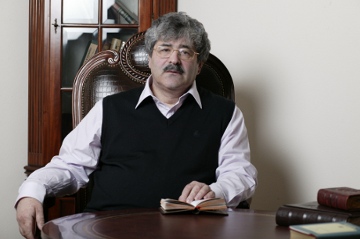"In Yekaterinburg, controversy erupted around the decision of an international judge, which rehabilitated foul language, recognizing three popular words, "not as insults, but interjections." The headline of a small newspaper article, which quite possibly did not belong to the author, also sounds like a sentence: "No censorship! The theme justifies obscene language ". The third sentence, however, is for all of us, and lies in a profound summary: "Unfortunately, swearing in the Russian language has become so common, and the judge's decision only recorded a sad reality."
The context of this unusual story belongs to Gogol's style. In a provincial city, an unknown lady, a matron of higher education, "publicly scolded the Dean of the same institution with obscene language in the presence of at least a dozen students." Remarkably, as a "witness for the defense", V. Dahl was "invited" to the courtroom or, more precisely, introduced in the form of some "modern version" of his well-known dictionary. If Dahl was alive in our time, or, on the contrary, the magistrate in some strange way, as in Gogol’s case, would be transported to the time of Pushkin's friend, we could probably lose this remarkable man in a duel, or in connection with the sudden death of the scientist, rendered by low insults.
Let us open Dahl’s dictionary, where he reveals the meaning of the words "obscene" and "foul language", and he gives the following definition: "obscene, is vile language". "Foul language" means, according to Dahl, "swearing." Well, in turn, "the foul-mouthed" has " no pride, no dignity, and no honor." Also Dahl has educational definitions. For example, "to be raunchy" means according to the great connoisseur of the Russian national lexicon "a spoiled child." But the most paradoxical of all this tragicomedy is that it does not matter who is accused of swearing, the magistrate that issued the verdict of acquittal, or the author of the article, were filled with apologetic maxims – that’s just women!
The sentence, or rather lack of it, says: "In modern speech, these words are used as an interjection of an expression of frustration and anger." I asked a well known human rights activist in the sphere of education, V. Panin, to comment on the court decision: "The court, that is the official institution of justice, which would seem to be fundamental in enforcing the law, morality, public interest and the individual, in reality (and de jure ) found that the use of obscene expressions is normal. The court's decision and comments from various experts in the article leave no doubt: we all need to come to terms with what is happening. Now, if we follow the logic of the judge’s decision, foul language can be safely used by the authors of a Russian textbook as an example of widely-used "interjection expressing frustration and anger."
From this perspective, it is not surprising that many foreign countries are studying Russian culture from textbooks in which obscene jokes about the infamous "Vovochka" (a character from anecdotes) are full of obscene vocabulary that can make even a dock worker blush, infused with striking naivety in its explanations. They say that "without such vocabulary it is impossible to understand many of the realities of Russian life." (See: http://www.rg.ru/2006/03/16/uchebnik.html)
In fact, as if to justify the verdict that "the judge's decision only recorded a sad reality," then murder, robbery, and drug addiction should be justified. Is not that a sad reality?
Recently V. Korotich in the Kiev newspaper "Facts" wrote a remarkable article, titled "Tight assed democracy." However, he gives the following definition of the word "tight ass". This "word" is used to denote a member of the public who is "brash, not very cultural, but insists on their right to be exactly like this." Giving an assessment to identify those who were "dragged to power" in 1917, the author writes: "The existence in the country of this" tight assed democracy "was suicidal, discarding former living standards and not replacing them with anything life-giving."
Let us add that the trouble nowadays is that modern "tight assed democracy" and its media is not limited to its usual existence in social ghettos, where it belongs. The "spiritual rabble" has splashed not only onto the streets, but it seeks to capture the commanding heights of culture, and impose its understanding of what is the norm and "modern taste." And this sticky, all-pervading and more aggressive obsession affects all sectors of society, including the most different of classes and even the highest.
So V. Panin is right when he stated that "what is happening is due to a general fall in the level of culture and education in the country," and he continues: "recently in Russia it has become fashionable, even from high political platforms, to use slang and bawdy expressions. I will not provide any examples, as they are very well known to everyone, and many of them have become part of the life of the modern man in the street. "
V. Solovyov early in the last century said that the role of government is not to make a paradise on earth; it is powerless to do so, but to prevent the implementation of hell on earth.
Worse than this, the embers of the fire of this miasma "tight assed democracy" have reached a point of poisoning the whole of society. It's time to do something about it.
<!--[if gte mso 9]> 96 800x600 <!--[if gte mso 9]> Normal 0 false false false RU JA X-NONE <!--[if gte mso 9]> <!--[if gte mso 10]> /* Style Definitions */ table.MsoNormalTable {mso-style-name:"Обычная таблица"; mso-tstyle-rowband-size:0; mso-tstyle-colband-size:0; mso-style-noshow:yes; mso-style-priority:99; mso-style-parent:""; mso-padding-alt:0cm 5.4pt 0cm 5.4pt; mso-para-margin:0cm; mso-para-margin-bottom:.0001pt; mso-pagination:widow-orphan; font-size:10.0pt; font-family:Calibri;} <!--StartFragment--> Meanwhile, the decision of the Yekaterinburg court in its essence is clear: "On you go, tight assed democracy!"<!--EndFragment-->
read more in our Telegram-channel https://t.me/The_International_Affairs

 17:03 09.09.2010 •
17:03 09.09.2010 •























